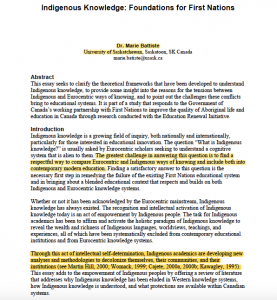
This essay by Dr. Marie Battiste at the University of Saskatchewan is a wonderful overview of Eurocentric knowledge and Indigenous knowledge. The author explores the ways in which Eurocentric knowledge has sought to discredit Indigenous knowledge, and she details the recent resurgence in interest, validation, and exploration of Indigenous ways of knowing – for example, in science, law, education, and ecology.
Battiste describes how, through an “act of intellectual self-determination, Indigenous academics are developing new analyses and methodologies to decolonize themselves, their communities, and their institutions” and that “Indigenous scholars discovered that Indigenous knowledge is far more than the binary opposite of western knowledge.”
She emphasizes the need for Indigenous knowledge especially in education, for both Indigenous and non-Indigenous people. She writes “more and more literature has challenged the suppression of Indigenous knowledge and has underscored the importance of bringing it into the mainstream to establish a body of knowledge that can be drawn on for the common good.”
As we know, “the exclusive use of Eurocentric knowledge in education has failed First Nations children. Indigenous knowledge is now seen as an educational remedy that will empower Aboriginal students if applications of their Indigenous knowledge, heritage, and languages are integrated into the Canadian educational system.”
Battiste describes Indigenous knowledge in general, but helpful terms: “Indigenous knowledge is an adaptable, dynamic system based on skills, abilities, and problem-solving techniques that change over time depending on environmental conditions[…]”. Furthermore, “Indigenous knowledge is also inherently tied to land, not to land in general but to particular landscapes, landforms, and biomes where ceremonies are properly held, stories properly recited, medicines properly gathered, and transfers of knowledge properly authenticated”.
She also notes that “focusing on the similarities between the two systems of knowledge rather than on their differences may be a more useful place to start when considering how best to introduce educational reform.” This sentiment inspired me to focus, in my final research paper, on how Indigenous education and non-Indigenous education are similar. I won’t be directly comparing the two, but to the extent that it comes up, my goal will be to see the similarities and – where there are differences – to see what I can learn from Indigenous ways of teaching and learning, in an effort to flip the script on assimilation.
Reference
Battiste M. 2005. Indigenous knowledge: Foundations for First Nations. WINHEC.
